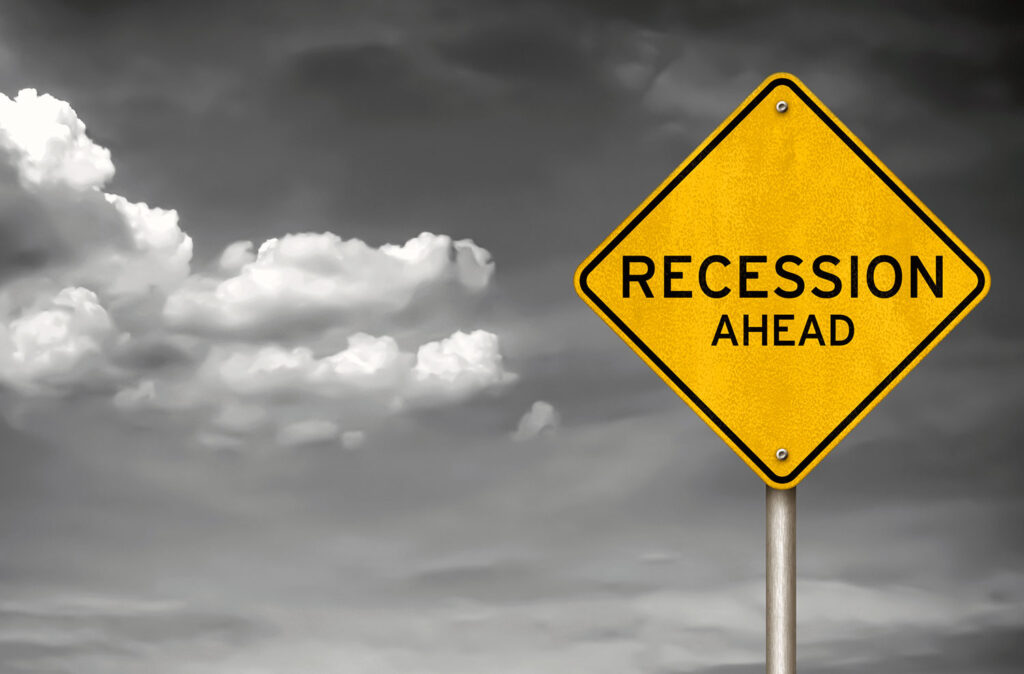There is a lot to consider when building healthy personal finances. From improving your credit score and having an emergency fund to saving for retirement and finding sound investments in the stock market, managing money can seem overwhelming. This is especially true during periods of economic uncertainty, like a recession. Understanding how to recession-proof finances can help you balance your cash flow, even when the economy is on the rocks.
A recession is a period of economic decline. Although not as serious as an economic depression, a recession can still severely impact economic activity, enough to cause market volatility, inflation, and economic uncertainty. During a recession, people might have to tap into their emergency savings or land in a cycle of high interest debt as they try to manage their finances and their increased living expenses.
However, there are steps you can take before a financial emergency happens to improve your cash flow and protect your assets to recession-proof your finances. It’s best to begin the process before you experience personal finance issues, but you can also steady your finances by using these tips during an economic downturn.
How To Protect Your Finances During a Recession (and Before)

Follow these tips to recession-proof finances before and during periods of economic uncertainty.
1. Make a Reasonable Budget
Understanding your personal finances and financial goals is the first necessary step toward protecting your income, retirement savings, home equity, and any investments or assets you have. Create a personal budget to paint an accurate picture of where your money goes each month.
Having a personal budget in place helps you stick to your financial goals, whether that’s spending less money on subscriptions or putting more money from your main income source into savings. Allocate a set amount toward your bills, other necessities, and savings goals. This budget should be in place prior to any bumps in the economy occurring, but it’s never too late to start one.
The key here is to make a budget that feels reasonable in any financial situation you find yourself in. Leave plenty of room for you to pay all your necessary bills but also for cash to go into your savings to help you prepare for possible income disruption during a recession.
Your budget should become your definitive guide to how you spend and save your money. If you give yourself enough room to build an emergency fund and save as much as you can, you’ll feel better prepared for a shifting economy.
2. Create a Backup Budget in the Case of Reduced Income

Once you have your regular budget in place, consider making a backup budget to use when you find yourself in a period of reduced income or want to be more careful with money during a recession. With this budget, pretend your income is lower so you have less money to work with. Then, divide that money reasonably into your bills, necessities, etc.
With your backup budget, you’ll have to be even more careful about where your money goes. For this budget, you’ll want to cut out any expenses that aren’t absolutely necessary, like dining out, TV and music subscription services, or maybe even a gym membership.
For each thing you eliminate from your backup budget, think of a few inexpensive replacements. For example, maybe investing in some affordable home gym equipment now can be a worthy replacement for giving up your gym membership later, should you need to. This way, you’ll be prepared if you do experience a drop in income and won’t feel as though you’re giving up everything you enjoy to save money.
3. Start Saving Money Now
If you haven’t started saving money yet and can afford to do so, it’s time. Savings can keep you afloat if a recession happens, helping you pay bills or fund emergencies if your income takes a hit. It also helps you budget for retirement as you build your retirement savings.
To maximize your savings, look for a high-yield savings account. These accounts have higher-than-average interest rates, allowing you to get more out of your savings. However, they do sometimes come with higher deposit requirements.
If you’re unsure how much to save from each paycheck, speak with a financial advisor who can help you plan for now and the future. This is especially helpful if you have a modest or low income and need financial advice about balancing savings with debt payments.
In some cases, a financial expert may direct you toward saving more instead of paying down debt faster if you can’t afford to do both. Although paying off debt is always a wise move, paying debt and saving with limited income can be challenging. A savings fund can help you cover expenses that occur if something happens with your job, including paying your debt. Plus, you’ll benefit from gaining interest on all the money you tuck into savings.
4. Bulk Up Your Work Hours (or Ask for a Raise)
If there’s room in your schedule to fit in extra hours at work, consider getting all the hours you can. Not only will this increase your pay if you work hourly, but you’ll also position yourself as a go-to person your team can rely on when they need someone to fill in. During a period of economic uncertainty, this is exactly the position you want to be in, potentially becoming someone your company doesn’t want to lose and securing your spot on the team.
If you get paid a salary or don’t have extra time to commit to longer workweeks, you might ask your boss for a raise instead. Even a small raise, like an extra $100 a month, can make a difference when you’re preparing for a recession. Anything extra you make, whether it’s from your new raise or extra work hours, can go straight into your savings account as you build your emergency fund.
5. Maintain Diversified Investments
Investing all of your money into one type of investment, like the stock market, isn’t a wise move if you want recession-proof finances. It’s better to put your money into multiple types of investments, like real estate, mutual funds, and cryptocurrency. The more diversified your portfolio, the more protected it is if one or two types of investments falter during a recession.
If you currently have just one investment type, think about moving some of that money into another investment. Work with a financial expert with investment expertise who can guide you toward the right investment strategies for your goals. On the other hand, if you already have your cash spread in different areas, avoid making any moves if the economy is moving downward. You’ll be happy you have additional investments to fall back on, even if they aren’t all thriving during a recession.
6. Refinance Your Debt into Fixed Rates
Do you have debts with variable interest rates? Variable interest is most common with home equity lines of credit, personal loans, and credit cards. Although variable rates often start out lower when you first open that credit account, they eventually begin fluctuating with market rates. So, during a recession when interest rates often skyrocket, your variable rate will go right up with the market rate, forcing you to pay more interest on your debt.
If possible, refinance your variable-rate debts into fixed-rate debts by looking for loan options with fixed rates. Ideally, the rate should be lower than the average rate of your current debts. Securing a fixed rate before inflation peaks can help you consolidate your debt when interest begins to climb.
7. Avoid Adding New Debt
Although it can be tempting to get a personal loan or another credit card when you find yourself under financial strain, it can potentially be one of the worst things you can do for your finances. Every time you add new debt, you have to make another monthly payment. Depending on how big your loan is or how much you need to put on your credit card, you could end up with hundreds of more dollars per month to pay when you’re already struggling to make ends meet.
Instead of adding new debt, consider whether there are any areas where you could cut back right now, even if it means only making your minimum payments on your current debt temporarily until you can afford to pay more. For example, are you paying extra toward your mortgage each month? Perhaps switching to the minimum payment for the next couple of months could free up some cash for other bills or your savings fund.
8. Pick Up a Side Job

If you’re worried about what your future financial picture might look like should a recession occur, it could be a smart move to pick up a side hustle. Ultimately, a gig that brings in passive income can be the most helpful way to boost your cash flow without adding a big time commitment to your schedule. Affiliate marketing, investing, or selling website themes, photography, or graphic designs online can bring in passive income.
Most importantly, look for something flexible that won’t interfere with your current job yet still lets you pick up extra cash when you need it, like becoming a driver for DoorDash or a shopper for Instacart. Or, start side work as a freelancer using special skills you have, like writing, video editing, or voiceovers.
It’s Never Too Early to Recession Proof Finances
When you take steps early to recession-proof your finances, you won’t have as much to worry about if another Great Recession happens. Take the steps to pay off credit card debt, personal loans, and student loan debt while your income is at its healthiest point, allowing you to have some money left over to stash into savings. As you build your emergency fund, you’ll feel more prepared to handle financial setbacks that come your way.
Financial independence is the ultimate goal for many, and it’s an excellent goal to reach if you want to feel financially secure during a recession. Create your budget now and stick to it. View your budget as a long-term plan for spending money within your means and taking you closer to a solid financial future. If a recession or a financial emergency occurs, you’ll be equipped to handle it with your wise spending habits, emergency funds, and recession-proof investment options.






